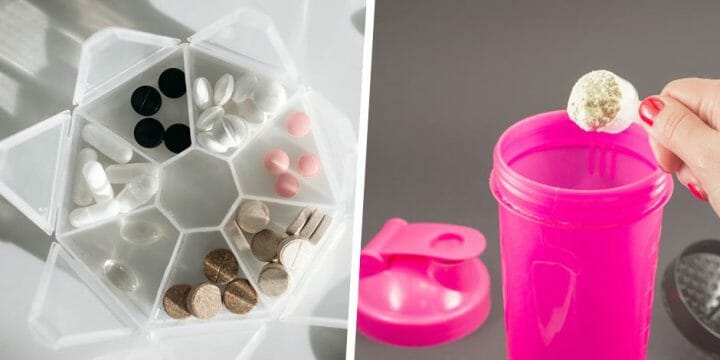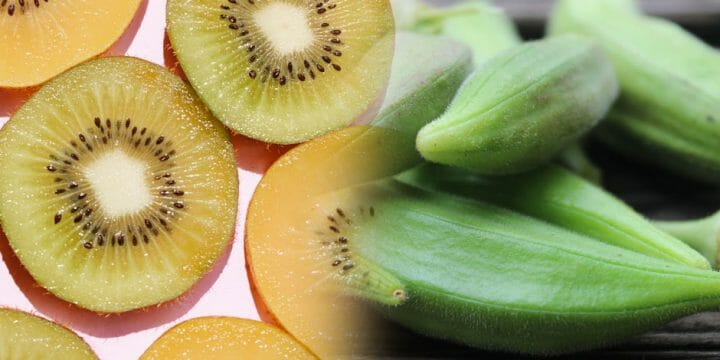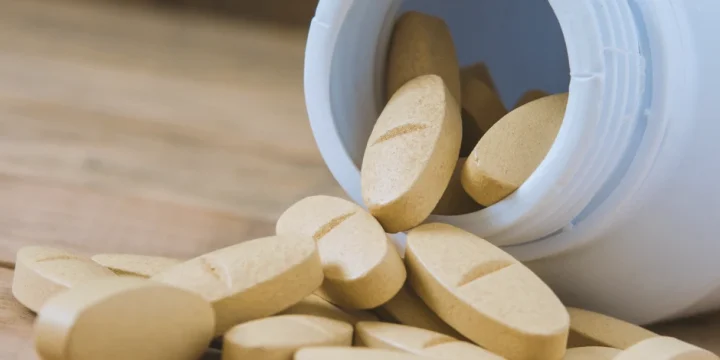Sugar blocker supplements are increasingly available, but before buying, consider trying alternative ways of blocking sugars.
As a doctor, diabetic patients often seek advice on regulating sugar levels. Consulting with my dietitian, we compiled a list of natural ways to block sugars.
Continue reading for guidance on maintaining stable energy and insulin sensitivity for overall health.
Quick Summary
- The best natural sugar blockers to reduce insulin spikes include increasing protein intake and adding a glass of wine to your daily routine.
- Consuming fiber-rich foods slows digestion, minimizes sugar spikes, and promotes prolonged satiety.
- Drinking 2 liters of water to stay hydrated aids in flushing out excess blood sugar and maintaining healthy blood glucose levels.
- In my opinion, prioritizing nutrient-dense foods, maintaining a consistent workout, and incorporating sugar-blocking supplements can regulate healthy sugar levels.
Natural Sugar Blockers
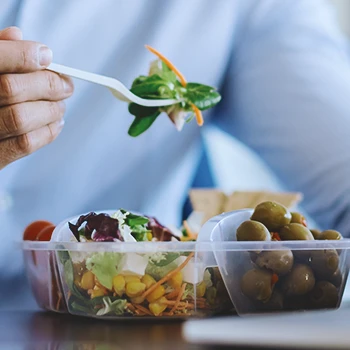
Maintaining a stable blood sugar level is crucial to prevent insulin spikes.
Insulin, a hormone that regulates blood sugar, can lead to reduced sensitivity in muscle cells, potentially contributing to heart disease and type 2 diabetes, as suggested by the Centers for Disease Control and Prevention [1].
Carbohydrates are the primary culprits behind these insulin spikes [2].
Fortunately, you can mitigate the impact of blood sugar elevation by incorporating natural substances into your meals.
For instance, according to a study in the National Library of Medicine, the fiber present in vegetables and fruits helps limit the breakdown and absorption of carbohydrates into the system [3].
“Eating fruits and vegetables, whole grains, and lean protein can help to keep blood sugar levels stable.”
– Blair King, MHD
6 Natural Ways of Blocking Sugars

Whether you pick an incremental approach to reducing your sugar intake, the following six sugar-blocking dietary and lifestyle recommendations will benefit you in the long term.
1. Have a Fatty Snack
Your stomach contains a valve that keeps food there until it's ready for the next phase of digestion. According to the Mayo Clinic, this valve is known as the pyloric valve [4].
The valve is what lies between the ziti in your stomach and a spike of glucose in your system. However, fat causes a response that restricts the valve and inhibits digestion, as per the National Institute of Health [5].
Taking a teaspoon of cheese or nuts before your meal will stimulate the pyloric valve to hold food for extended periods.
This effect will slow down the digestive process, reduce sugar spikes and make you feel fuller for more extended periods.
2. Start Your Meal With a Salad
Research from the National Institute of Health indicates that soluble fiber found in plants, legumes, carrots, and some fruits aids in the absorption of carbohydrates and sugar [6].
This is because it blocks sugar as it passes through your small intestine.
Although the fiber eventually dissolves, the process takes longer, and the slower absorption rate reduces the quantity of insulin required by your body to manage it.
3. Have Some Vinegar
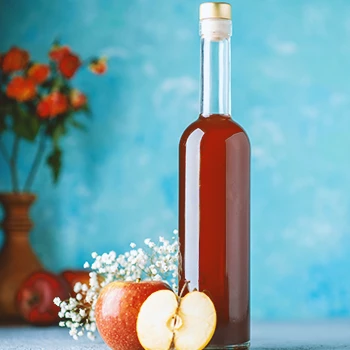
Vinegar, with its high acetic acid content, slows the breakdown of starch into sugar by inhibiting amylase, according to the National Institute of Health [7].
It specifically affects starch, not refined sugar. Additionally, it enhances insulin sensitivity, reducing the need for excessive insulin production to process starches.
For weight loss, I incorporate apple cider vinegar into my meals by adding a few teaspoons to salad dressing and sprinkling it over meat.
4. Include Some Protein
If you want to reduce the subsequent blood sugar surge, your body needs to start producing insulin as soon as possible.
Proteins help you lose weight by reducing the amount of insulin needed for carbohydrate digestion. Although proteins don't supply glucose, they trigger rapid "first-phase insulin sensitivity."
According to the National Institute of Health, the process happens so quickly, preventing prolonged sugar spikes and minimizing overall insulin requirements for meal processing [8].
5. Eat Lightly Cooked Vegetables
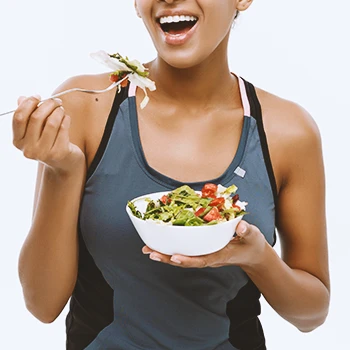
Fruit can help absorb starch, but vegetable sugar blockers are the greatest, as they contain more fiber and much less sugar.
When you overcook vegetables, it saturates the soluble fiber, soaking it in water. This prevents it from absorbing the starch and sugar.
However, lightly cooked veggies break down more slowly, so you'll feel satisfied for longer. Roasted vegetables are a great tasty alternative for starchy side dishes.
6. Have a Glass of Wine With a Meal
Studies from the National Institute of Health indicates that wine has specific sugar-blocking effects by briefly inhibiting your liver's glucose generation when consumed with a meal [9].
It's essential to note that excessive alcohol intake can lead to added calories and reduced feelings of fullness, potentially leading to overeating.
Keep this in mind when choosing a starch-heavy dish at a restaurant.
Can Increased Hydration Help Regulate Sugar Levels?
Yes, staying well-hydrated can indeed assist in regulating sugar levels by aiding the kidneys in removing excess sugar from the body.
Studies published by the National Institute of Health indicate that adequate hydration supports the kidneys in eliminating excess sugar, and the inclusion of fiber in your diet contributes to stabilizing blood sugar levels [10] [11].
Furthermore, the European Food Safety Authority recommends an average daily water intake of about 1.6 liters for women and 2 liters for men [12].
FAQs
What Foods Block Sugar Naturally?
Foods that naturally block sugar include fruits, nuts, oatmeal, legumes, and fatty fish. Consumption of these foods can help regulate blood sugar levels, reducing sugar spikes. Incorporate them into your diet for stable energy and improved insulin sensitivity.
How Do You Stop Sugar Absorption Naturally?
You can stop sugar absorption naturally by eating a reduced typical serving of carbohydrates and exercising regularly. Additionally, eating fiber-rich foods like vegetables and fruits, as fiber inhibits carbohydrate absorption. These strategies can help regulate blood sugar levels and reduce the impact of sugar absorption.
What Food Neutralizes Sugar?
Foods that neutralize blood sugar include pumpkins, nuts, broccoli, carrots, okra, and beans. Incorporating these into your diet can help regulate and maintain blood sugar levels and counteract the effects of sugar consumption for better overall health.
References:
- https://www.cdc.gov/diabetes/basics/insulin-resistance.html
- https://www.ncbi.nlm.nih.gov/pmc/articles/PMC1204764/
- https://www.ncbi.nlm.nih.gov/pmc/articles/PMC3257631/
- https://www.mayoclinic.org/stomach-and-pyloric-valve/img-20007962
- https://www.ncbi.nlm.nih.gov/pmc/articles/PMC2981385/
- https://pubmed.ncbi.nlm.nih.gov/1663443/
- https://www.ncbi.nlm.nih.gov/pmc/articles/PMC7541927/
- https://pubmed.ncbi.nlm.nih.gov/24986822/
- https://pubmed.ncbi.nlm.nih.gov/9815011/
- https://pubmed.ncbi.nlm.nih.gov/34186361/
- https://www.ncbi.nlm.nih.gov/pmc/articles/PMC4950069/
- https://www.diabetes.co.uk/food/water-and-diabetes.html
About The Author
You May Also Like
